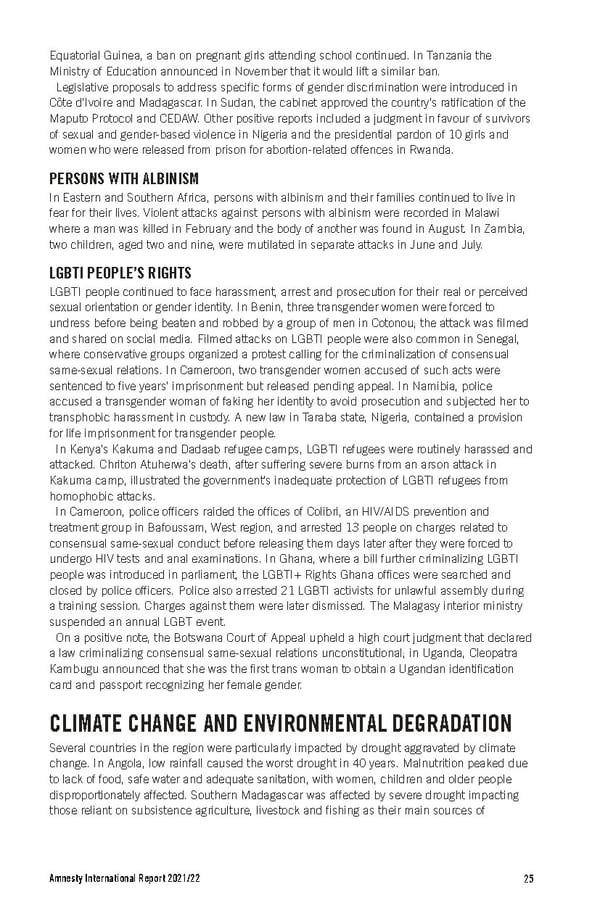Equatorial Guinea, a ban on pregnant girls attending school continued. In Tanzania the Ministry of Education announced in November that it would lift a similar ban. Legislative proposals to address specific forms of gender discrimination were introduced in Côte d’Ivoire and Madagascar. In Sudan, the cabinet approved the country’s ratification of the Maputo Protocol and CEDAW. Other positive reports included a judgment in favour of survivors of sexual and gender-based violence in Nigeria and the presidential pardon of 10 girls and women who were released from prison for abortion-related offences in Rwanda. PERSONS WITH ALBINISM In Eastern and Southern Africa, persons with albinism and their families continued to live in fear for their lives. Violent attacks against persons with albinism were recorded in Malawi where a man was killed in February and the body of another was found in August. In Zambia, two children, aged two and nine, were mutilated in separate attacks in June and July. LGBTI PEOPLE’S RIGHTS LGBTI people continued to face harassment, arrest and prosecution for their real or perceived sexual orientation or gender identity. In Benin, three transgender women were forced to undress before being beaten and robbed by a group of men in Cotonou; the attack was filmed and shared on social media. Filmed attacks on LGBTI people were also common in Senegal, where conservative groups organized a protest calling for the criminalization of consensual same-sexual relations. In Cameroon, two transgender women accused of such acts were sentenced to five years’ imprisonment but released pending appeal. In Namibia, police accused a transgender woman of faking her identity to avoid prosecution and subjected her to transphobic harassment in custody. A new law in Taraba state, Nigeria, contained a provision for life imprisonment for transgender people. In Kenya’s Kakuma and Dadaab refugee camps, LGBTI refugees were routinely harassed and attacked. Chriton Atuherwa’s death, after suffering severe burns from an arson attack in Kakuma camp, illustrated the government’s inadequate protection of LGBTI refugees from homophobic attacks. In Cameroon, police officers raided the offices of Colibri, an HIV/AIDS prevention and treatment group in Bafoussam, West region, and arrested 13 people on charges related to consensual same-sexual conduct before releasing them days later after they were forced to undergo HIV tests and anal examinations. In Ghana, where a bill further criminalizing LGBTI people was introduced in parliament, the LGBTI+ Rights Ghana offices were searched and closed by police officers. Police also arrested 21 LGBTI activists for unlawful assembly during a training session. Charges against them were later dismissed. The Malagasy interior ministry suspended an annual LGBT event. On a positive note, the Botswana Court of Appeal upheld a high court judgment that declared a law criminalizing consensual same-sexual relations unconstitutional; in Uganda, Cleopatra Kambugu announced that she was the first trans woman to obtain a Ugandan identification card and passport recognizing her female gender. CLIMATE CHANGE AND ENVIRONMENTAL DEGRADATION Several countries in the region were particularly impacted by drought aggravated by climate change. In Angola, low rainfall caused the worst drought in 40 years. Malnutrition peaked due to lack of food, safe water and adequate sanitation, with women, children and older people disproportionately affected. Southern Madagascar was affected by severe drought impacting those reliant on subsistence agriculture, livestock and fishing as their main sources of Amnesty International Report 2021/22 25
 Amnesty International Report 2021/22 Page 24 Page 26
Amnesty International Report 2021/22 Page 24 Page 26